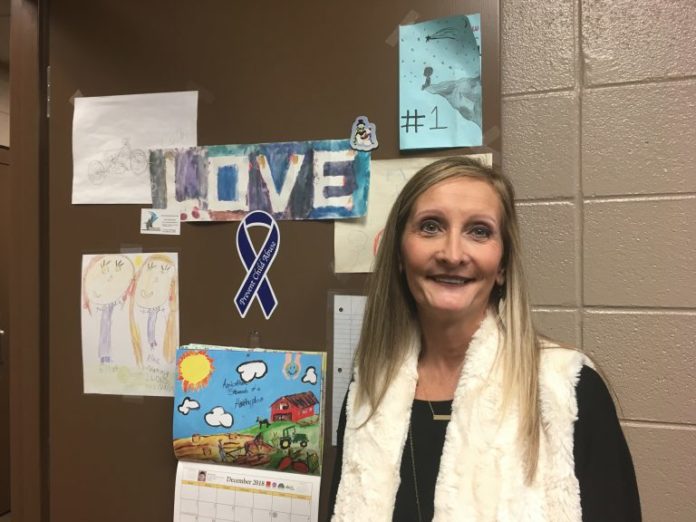
CULLMAN, Ala. – Alabama recently received an A on its “report card” from Shared Hope International (SHI) for the state’s positive response to the issue of human sex trafficking. Its overall score landed Alabama at the sixth position in the country; neighboring Tennessee took the top spot.
Cullman County Human Trafficking Task Force Chair Kathy Wilson told The Tribune: “Alabama has scored a 94.5. Since this process began in 2011 by Shared Hope, Alabama has risen from a 66, D, to this 94.5, A. Our local task force has been instrumental in raising awareness and educating our community. Our state has strengthened the laws related to Human Trafficking, and this is the reason for the grade of an A; not only the laws, but identifying and providing services to victims.”
In its report on the state, SHI reported, “Alabama criminalizes the sex trafficking of minors, defined as individuals under 19, without requiring proof of coercion or deception or third-party control. Further, a ‘sexually exploited child’ may not be adjudicated delinquent for the crime of prostitution. Although state law provides for a range of community-based services, these services are not required to be specialized to the unique needs of commercially sexually exploited children.”
The report also broke down and explained the grade as follows:
- Criminalization of Domestic Minor Sex Trafficking, 7.5 out of 10 (4.5 in 2011) – Alabama’s human trafficking law criminalizes trafficking an individual under 19 for sexual servitude without requiring proof of coercion or deception. Commercial sexual exploitation of children (CSEC) laws include “promoting prostitution; first degree,” “promoting prostitution; second degree,” “facilitating solicitation of unlawful sexual conduct with a child,” “facilitating the travel of a child for an unlawful sex act,” and “engaging in an act of prostitution with a minor.” The prostitution article refers to the human trafficking law through the definition of “sexually exploited child,” which is defined to include a child sex trafficking victim, thereby acknowledging the intersection of prostitution with trafficking victimization. Alabama has not enacted a racketeering or gang crimes law that could be used to prosecute sex trafficking enterprises.
- Criminal Provisions for Demand, 25 out of 25 (11 in 2011) – The trafficking law applies to buyers who give monetary consideration to engage in sexual conduct with a minor and to those who solicit or obtain a minor for commercial sex. Buyers may also be prosecuted for “engaging in an act of prostitution with a minor,” and state law distinguishes between soliciting sex acts with minors versus adults. Buyers convicted of “human trafficking in the first degree” face 10–99 years or life imprisonment and a fine up to $60,000, while “engaging in an act of prostitution with a minor” is punishable by 2–20 years imprisonment and a fine up to $30,000. “Electronic solicitation of a child” and “facilitating solicitation of unlawful sexual conduct with a child” could lead to additional penalties for buyers who use the Internet to commit illegal sex acts. The buyer-applicable trafficking and CSEC provisions expressly prohibit an age mistake defense. Buyers convicted of trafficking face mandatory restitution and criminal asset forfeiture. If convicted of any other criminal offense, restitution is mandatory if the victim suffered pecuniary loss. Buyers also face criminal asset forfeiture for prostitution-related offenses and for possession of child sexual abuse material (CSAM). Buyers convicted under Alabama’s human trafficking and CSAM laws will be required to register as sex offenders.
- Criminal Provisions for Traffickers, 15 out of 15 (14.5 in 2011) – “Human trafficking in the first degree” and “facilitating the travel of a child for an unlawful sex act” are felonies punishable by 10–99 years or life imprisonment and a fine up to $60,000; “promoting prostitution in the first degree” is a felony punishable by 2–20 years imprisonment and a fine up to $30,000, while “promoting prostitution in the second degree” and “facilitating solicitation of unlawful sexual conduct with a child” are felonies punishable by 1–10 years imprisonment and a fine up to $15,000. Alabama law criminalizes producing, disseminating, or displaying CSAM as well as permitting or allowing a child to engage in the production of CSAM. “Electronic solicitation of a child” and “facilitating solicitation of unlawful sexual conduct with a child” could lead to additional penalties for traffickers who use the Internet. A convicted sex trafficker faces mandatory restitution and criminal asset forfeiture. Traffickers convicted of prostitution-related offenses face forfeiture of “property, proceeds, or instrumental[ities] . . . used or intended for use in the course” of the crime. Traffickers convicted under Alabama’s human trafficking, CSEC, and CSAM offenses will be required to register as sex offenders. Additionally, human trafficking and CSEC are included as grounds for terminating parental rights based on the definition of “abuse.”
- Criminal Provisions for Facilitators, 10 out of 10 (7 in 2011) – Benefiting financially from human trafficking is a felony punishable by 2–20 years imprisonment and a fine up to $30,000; “promoting prostitution in the first degree” is a felony punishable by 2–20 years imprisonment and a fine up to $30,000, while “promoting prostitution in the second degree” and “facilitating solicitation of unlawful sexual conduct with a child” are felonies punishable by 1–10 years imprisonment and a fine up to $15,000. “Facilitating the travel of a child for an unlawful sex act” is a felony punishable by 10–99 years or life imprisonment and a fine up to $60,000. Facilitators convicted of sex trafficking are subject to criminal asset forfeiture and mandatory victim restitution, and facilitators convicted of prostitution-related offenses face forfeiture of “property, proceeds, or instrumental[ities] . . . used or intended for use in the course” of the crime. “Engaging in an act of prostitution with a minor” expressly prohibits the sale of travel services for the purpose of engaging in sexual exploitation of a minor.
- Protective Provisions for the Child Victims, 22 out of 27.5 (16.5 in 2011) – Alabama’s core child sex trafficking offenses define all commercially sexually exploited children as victims of sex trafficking. The human trafficking law expressly prohibits a defense based on the willingness of the minor to engage in the commercial sex act. Additionally, Alabama law prohibits the criminalization of sexually exploited children for prostitution offenses. A juvenile sex trafficking victim should be identified as dependent or as a child in need of supervision rather than as delinquent, but Alabama law does not provide a statutory avenue to specialized services. Although child sex trafficking is not identified as a type of abuse and neglect within Alabama’s child protection statutes, the definition of “abuse” includes sexual exploitation of a child regardless of the child’s relationship to the perpetrator of the abuse. Child sex trafficking victims who suffer serious personal injury are eligible for crime victims’ compensation but face barriers to recovery if the victim is considered an accomplice to a criminal act, fails to report the crime to law enforcement within 72 hours, or fails to file a claim within one year unless good cause is shown. Victim-friendly trial procedures, including videotaped depositions and testimony by closed circuit examination, are limited to children under 16 who are victims in criminal prosecutions for sexual offenses or sexual exploitation; if the victim is under 12, a child’s out-of-court statements may be admitted. However, testifying victims in human trafficking and CSEC prosecutions are not protected under the “rape shield” law, which reduces trauma associated with cross-examination. Alabama law does not provide a mechanism for minors to vacate delinquency adjudications related to their trafficking victimization, and delinquency records may only be sealed or destroyed under narrow circumstances. Individuals convicted of human trafficking must pay victim restitution, and civil actions are authorized. Prosecutions for “sex offenses,” including Alabama’s human trafficking laws and several CSEC laws may commence at any time, and civil actions must commence within 5 years of the victim being freed from human trafficking or the victim turning 18.
- Criminal Justice Tools for Investigation and Prosecution, 15 out of 15 (12.5 in 2011) – Resources and training regarding sexually exploited children may be available to law enforcement. Single party consent to audiotaping is permitted, and wiretapping is an available investigative tool for law enforcement. Two CSEC offenses, “facilitating solicitation of unlawful sexual conduct with a child” and “facilitating the travel of a child for an unlawful sex act,” prohibit a defense to prosecution based on the use of a law enforcement decoy posing as a minor during investigations of these crimes. Further, use of the Internet is a permissible investigative technique under Alabama’s electronic solicitation of a minor law. Alabama has established a statewide reporting and response system for missing children and requires the reporting of missing and located missing children.
Wilson was pleased with the results, but would still like to see Alabama hit a perfect score.
“We still have work to do because we are not at 100,” she said. “I feel the efforts of our local task force have begun to make the difference in our community. We are more well-received than when we began in 2015. People are understanding that human trafficking here takes a different role than if we lived in a major city. People are not being abducted off the street into a van and taken to another country. We deal with familial or boyfriends selling their girlfriends for a case of beer or drugs, mom selling her daughter to the landlord for the month’s rent. These are real; they happen here!”
Cullman County Juvenile Probation Chief and task force member Kay Bell said, “I think that we’re educating the public more; we’re going into the schools. I think our effort as a task force, I feel like we’re progressing that way, because of the opportunity to educate our community. And it’s not just about the stereotypical trafficker; it touches everyone.”
Wilson added, “Because trafficking in Cullman may not be the same as trafficking in Chicago, Illinois, but it’s still here, it’s still present. And Kay’s right: the education that we’ve provided I just feel like raises awareness, which is our goal- to raise awareness. And we have good community partners that help provide that education, so bringing it local is really where we make our progress.”
January is Human Trafficking Awareness Month
Wilson told The Tribune, “January is Human Trafficking Awareness month and we will be out in full force to educate our community! This is the only way to end this epidemic and keep our community safe!”
Wilson reported that the task force is currently working on several projects as it approaches Human Trafficking Awareness Month:
- Planning a day-long awareness event at Karma’s Coffee House, which has hosted and raised funds for the task force in the past, Jan. 10, 2019. A portion of sales at the shop in January will benefit the task force.
- Working with Wallace State Community College to produce a public service announcement video that is set to begin filming next week
- Working with the Cullman County Mayors and Commissioners Association to have each municipality issue a proclamation supporting awareness efforts
- Working with Cullman’s city government toward a goal of having the city declared a “trafficking-free zone.” To achieve that declaration, every city employee would have to receive training in recognizing and responding to human trafficking. According to Wilson, the training is brief and could possibly be done online. Cullman would only be the second city in Alabama to achieve that status, behind Vestavia Hills. Such a status obviously would not make Cullman instantly free of human trafficking, but would at least help the city be a place more dangerous for traffickers than their victims.
For more on the Cullman County Human Trafficking Task Force, visit www.facebook.com/Cullman-County-Human-Trafficking-Task-Force-870585096352748/.
Copyright 2019 Humble Roots, LLC. All Rights Reserved.




















